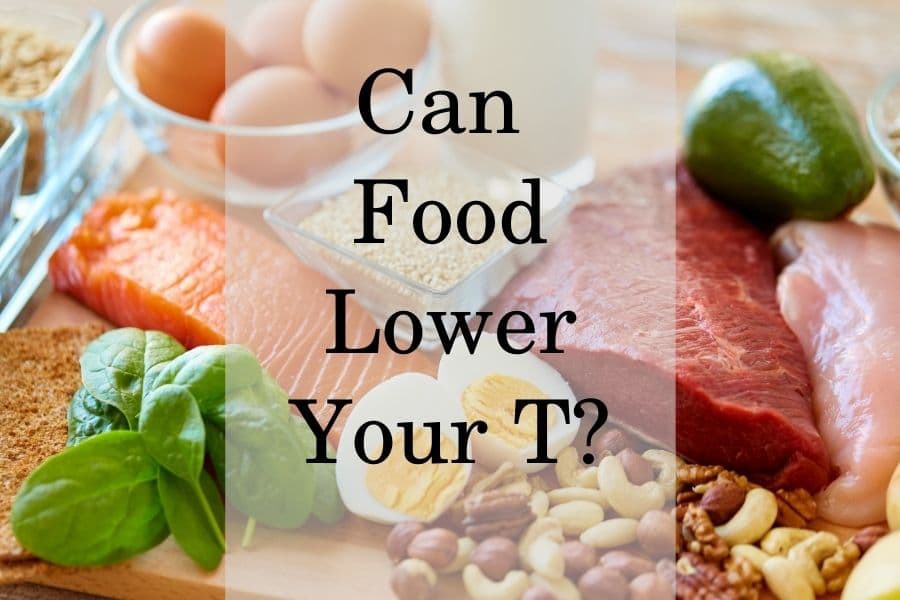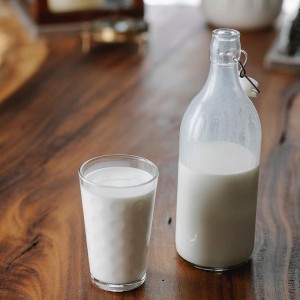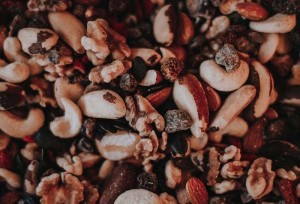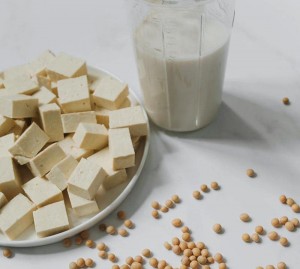In this article
There has been much controversy and research regarding dietary and environmental influences on testosterone (T) levels, and in many areas, research remains inconclusive.
Whilst there are no foods that “kill” testosterone, there are some substances that may influence the level of testosterone in the body.fas
Here we dissect the current research and provide some recommendations on how to keep yourself healthy.
Dairy products
Commercial milk products commonly contain estrogen. This estrogen is produced by pregnant dairy cows to promote the production of milk, and in fact, 60–80% of all estrogen obtained in the average diet comes from milk.
Excess estrogen can act on the brain to reduce our own body’s production of sex hormones, including testosterone.
Does milk decrease testosterone?
There have been some small studies looking at the relationship between dairy intake and T levels in adults. Some have reported increases in estrogen and decreases in testosterone after consuming dairy products and there is evidence that consumption of full-fat dairy products is associated with reduced sperm quality.
Dairy products may also be linked to an increased risk of prostate cancer. Most studies however show dairy products have minimal or no effects on testosterone level and a large review of available literature in 2018 concluded that while milk does contain estrogens, it is unlikely to be harmful to health.
Milk is an excellent source of protein, calcium and vitamin D which are important for bone health. So the benefits of dairy likely outweigh the risks when consumed in moderation.
Cheese and other dairy products are high in cholesterol. Cholesterol is generally considered unhealthy, and certainly, a high cholesterol diet is not good for you.
However, cholesterol is required in moderation for the process of steroidogenesis (the production of sex hormones such as testosterone).
More on the topic: Can Testosterone Cause Prostate Enlargement?
Alcohol
Increased intake of any kind of alcohol is strongly linked with decreased testosterone levels. Alcohol consumption can lead to a drop in T level in less than an hour, which may be the cause of reduced libido (sex drive) and erectile difficulties experienced when under the influence.
Alcohol is directly toxic to the cells within the testes, damaging the cells where testosterone is produced. Studies indicate that moderate alcohol consumption (1–2 drinks per day) can lead to a slight reduction in T levels in men, with heavy drinking (4 or more drinks per day) leading to a significant reduction.
High alcohol intake also leads to a whole host of other health conditions such as liver disease
The liver is involved in the production of many hormones, which may be another mechanism behind decreased testosterone in heavy drinkers.
Which alcohol is “better” for testosterone?
The type of alcohol might also have a minor influence. Beer contains more estrogen, which as previously mentioned, can function to reduce testosterone. Still, there have not been any studies showing that beer is any worse than any other type of alcohol in terms of effects on testosterone.
There have been studies of the beneficial antioxidant properties of red wine, and even one showing that red wine might increase testosterone. However, this study was performed in a lab and the findings have not been translated to real people.
Therefore, there’s no evidence that any particular type of alcohol is ‘safe’ and will not cause a decrease in testosterone levels.
Better to stick to the recommended limits, which are 2 drinks per day in men and 1 drink per day in women
Flaxseed
Flaxseed is commonly touted as a healthy addition to the diet. It is high in fiber and contains many vitamins. However, flaxseed also contains lignans, which may be associated with a reduction in testosterone, likely due to the molecular similarity to estrogen.
Flaxseed supplementation can reduce T levels in women with polycystic ovarian syndrome (PCOS) and men with prostate cancer
However, there have been no studies that have shown that flaxseed alters testosterone levels in healthy people. Flaxseed is a great source of protein, fiber and antioxidants.
Since there is generally little evidence for any negative effects in healthy people, it can usually be safely incorporated as part of a healthy balanced diet.
Licorice
Licorice has been a popular natural remedy for many conditions for centuries.
There have been some small studies that have reported supplementation of licorice root causes a decrease in testosterone in women taking it over a short period, as a remedy for PCOS. Two small studies by Armanini et al., in healthy men supplemented with licorice also showed a decrease in total testosterone levels.
However, other studies have not been able to reproduce this effect or to support the total elimination of licorice from the diet in healthy men.
It is also worth noting that these studies are of licorice root, which is not the same as the licorice incorporated in many types of candy.
Refined carbohydrates
Refined carbohydrates are often referred to as “empty calories”, and are found in white flour, bread, rice, pasta and sugars. Excessive intake of carbohydrates and sugars can be the cause of developing metabolic syndrome and diabetes.
Both of these conditions are independently associated with a lower T level and a reduced sperm count. Testosterone levels can dip straight after eating sugar, however, it is not clear the long-term effects.
Can the Western diet lower your T?
There is evidence that people following a traditionally Western diet have a reduced sperm count. The Western diet includes a high intake of processed meats, high-fat dairy, refined carbohydrates and sugars.
This is often compared with the Mediterranean diet, which is low in carbohydrates and high in eggs, fish and oils. A study has suggested that a traditional Western diet is an independent predictor of testosterone deficiency.
Whilst it’s not essential to completely eliminate refined carbohydrates, it is smart to be mindful of how much of your diet they make up. It is recommended that carbohydrates make up 45–65% of the diet, focussing on healthier sources of carbohydrates, such as whole grains, vegetables and legumes.
Carbohydrates are essential for health, and there is no evidence that eating a healthy proportion of carbohydrates will harm testosterone levels
In terms of overall calorie intake, a 2019 study of 3128 men found that a restrictive (<1800 calorie) low-fat diet was associated with a lower mean T level. So having a restrictive diet overall may be harmful to testosterone levels, and should be avoided unless there is a specific requirement for weight loss.
Nuts
Nuts are a great source of protein, fats and minerals such as selenium. There have been a few studies on the direct association of nuts with testosterone levels.
A study in women with PCOS showed that walnuts significantly increased levels of sex hormone-binding globulin (SHBG), a protein that binds to testosterone and reduces the amount of circulating. However, in this study, there was no change in actual T levels after consumption of either walnuts or almonds.
Some nuts contain high levels of magnesium and vitamin E, in particular almonds and cashews.
Magnesium deficiency may affect sexual function in older men as it interferes with the normal production and function of testosterone. Thus, to avoid deficiencies and potential effects on sexual function, make sure that your diet contains enough magnesium-rich foods.
Zinc deficiency also has links with testosterone deficiency. Nuts such as almonds, pine nuts, cashews and almonds are found to be high in zinc.
Walnut oil has been reported to increase testosterone levels in rats, but this has not been translated to human studies.
There is no evidence that walnut oil decreases testosterone, however, it may make a tasty alternative to other vegetable oils
Overall there is no evidence that nuts directly lower testosterone. In fact, plenty of evidence support that nuts may be beneficial, not only for hormones but for overall health.
Soy products
Soy is known as a phytoestrogen, which means it mimics the structure of the estrogen naturally found in the body. Therefore it can alter the amount of circulating estrogen and testosterone and there is evidence that consumption of soy protein can lead to reductions in T levels in men.
Some studies reported a decrease in testosterone among men taking soy. Dillingham et al. studied men taking protein powders including milk and soy, with results indicating significant reductions in serum dihydrotestosterone (a form of testosterone) with consumption of soy protein.
These studies were contradicted by a large meta-analysis by Hamilton-Reeves et al. in 2009. This study showed that neither soy foods nor soy supplements alter measures of testosterone in men.
Other researches were inconclusive as well. A clear understanding of the effects of soy products on testosterone could not be derived from the data. Considering tofu specifically, in studies where meat products were replaced with tofu, serum T levels were unchanged.
So in terms of soy, there is some evidence that it may lower testosterone levels, so it may be sensible to consume soy only in moderation if you are concerned about T levels.
There is not enough evidence to suggest that removing soy entirely from the diet is sensible or recommended
Mint
Mint, along with several other herbal remedies, has been used for years for the treatment of fertility disorders such as PCOS in women.
There have been small observational studies that revealed that testosterone levels are significantly reduced in women with PCOS following the introduction of a mint-based herbal remedy.
However, these studies have failed to translate into an improvement in symptoms of PCOS e.g. acne (spots), or hirsutism (excess body hair).
In 2020, Ainehchi et al. conducted a study on 60 infertile women with PCOS. And compare traditional treatment with a drug called Clomifene, a herbal mixture (containing mint among other herbs), and a combination of both.
The results showed that the combined mixture was better than no treatment, or Clomifene alone.
Mint may be beneficial in women with PCOS and increased testosterone levels
It is unclear if consumption of mint has a similar effect on T levels in men.
Trans and Saturated Fats
Fat is an essential part of our diet and is required for the absorption of vitamins. It is also required for the making of sex hormones, including testosterone. However, a high-fat diet is linked to multiple health problems.
In 2016 a randomized controlled trial of 118 obese men was published which showed that both a low-fat high carbohydrate, and low-fat high protein diet increased levels of T, and improved sexual function.
However, in this study, the participants also experienced a significant weight loss, which is known to increase T levels in obese people.
Many other studies have reported that consumption of a high-fat diet is associated with reduced testosterone levels
A study from 2017 showed that consumption of specifically trans fats was correlated with a reduction in testosterone levels.
Trans fats are commonly found in processed foods such as fast food, cakes, margarine, and low-quality meat. Trans and saturated fats are also correlated with cardiovascular disease, diabetes and cancers so are best limited in the diet.
It is recommended that a healthy diet should comprise 25–35% fat, with no more than 10% being saturated or trans fats. This will help keep yourself healthy and keep hormone levels optimal.
Vegetable oils
Olive oil is an excellent source of monounsaturated fats and is a preferable source of fat to saturated or trans fats. Many animal studies show the beneficial effects of olive oil on testicular function.
In human studies, olive oil has also been shown to increase testosterone levels
Vegetable oils include coconut oil, corn oil, rapeseed oil, soybean oil and sunflower oil, which differ in their composition and content of omega fatty acids.
Coconut oil in particular has been suggested to alter the metabolism of testosterone, increasing levels and improving sexual function. This is yet to be demonstrated in clinical research.
Vegetable oils are often high in trans fats, so it is important to limit consumption of these oils, and instead opt for olive oil with its healthier monounsaturated fat.
There is no evidence that consumption of one particular oil over another has significant effects on T levels, and there is no indication for completely cutting out any oil from the diet.
Pesticides
Residual pesticides such as organophosphates have been found on the surface of fruits and vegetables.
Studies have reported that male farmers exposed to high levels of organophosphate pesticides have significantly lower levels of testosterone than non-farmers. It’s important to note that several studies have also shown no such correlation and it is unclear the relevance of findings to the general population.
If you are not regularly exposed to commercial pesticides, they are unlikely to have a significant effect on T levels.
As pesticides can persist on the surface of produce it is recommended to wash and/or peel fruits and vegetables before eating.
Organic products use lower levels of pesticides, so switching to organic products can reduce the risk of pesticide harm
PFAS chemicals
Per- and polyfluoroalkyl substances (PFAS) are a group of over 500 human-made chemicals that are used in the manufacture of packaging and fabrics.
There have been numerous studies on the health implications of increased exposure to PFAS, revealing connections with thyroid disease, immune conditions, increased cholesterol and liver damage. In fact, some PFAS have now been removed from production, in particular substances used in takeout boxes.
Several studies have indicated that those exposed to specific PFAS (indicated by the presence of the compound in the blood) had an increased risk of testicular and prostate cancer.
There is also limited evidence that exposure to PFAS increases the incidence of poor sperm quality and low testosterone levels. The mechanisms for this remain unclear.
These studies were conducted on men working in factories with PFAS and it is unclear how this translates to the general population. A review article published in 2016 concluded that there was little evidence of an association between PFAS levels and testosterone levels.
PFAS cannot be removed by washing or cooking. The FDA states that the levels of PFAS in foods are low and do not pose a risk to human health. Thus, there is no indication of avoiding food or groceries, and by all accounts, further research is needed.
What actually lowers your T levels?
Testosterone deficiency can be caused by medical conditions, medication or drug use, lifestyle factors, physical trauma and simply the normal aging process. In many cases, there is no specific underlying cause found, which raises the question of if diet plays any role in testosterone levels.
There are many medical conditions linked to a decreased T level, in particular genetic abnormalities such as Kallman syndrome and Klinefelter syndrome. They are normally diagnosed in childhood, so you would likely already be aware of having this kind of diagnosis.
Testosterone deficiency is more commonly found in men with chronic illnesses such as diabetes, cardiovascular (heart) disease, pulmonary (lung) disease and depression.
If you have been diagnosed with testosterone deficiency, it is important to discuss the risks and benefits of testosterone replacement therapy (TRT) with a medical expert.
However, it is difficult to say if low T increases the risk of developing the illness, or whether poor health leads to a reduction in testosterone.
Lower levels are also linked with changes in how the body processes sugar, e.g. insulin resistance, type II diabetes and obesity.
If you have a chronic illness, it is important to regularly engage with your healthcare professionals to optimize your management plan
Obesity is well-known to be linked to a decreased T level in men. Partly because fat cells promote the conversion of testosterone to estrogen and decline in circulating T levels. Weight loss is therefore one of the most effective non-pharmacological methods for increasing testosterone with multiple large studies confirming this.
Other common medical conditions associated with reduced testosterone levels include thyroid disorders, liver and kidney diseases. Reduced levels can also be caused by a pituitary tumor, a type of brain tumor which alters normal hormone levels.
Testosterone level naturally declines with age, at a rate of around 1-2% per year from the age of 30–40, as part of the normal aging process. As many of the symptoms of deficiency are also found in normal aging, it is difficult to say if declining in the older age group is a problem.
Increased alcohol intake, smoking, inactivity and inadequate sleep are also strongly associated with decreased testosterone levels
The Takeaway
In conclusion, moderation is key. There are no foods that will kill or destroy your T levels. But poor diet and lifestyle will undoubtedly predispose you to many health problems, including hormonal imbalance.
Over-consumption of any food, or regular, sustained exposure to any chemical holds a risk of adverse effects. If you have worrisome symptoms that you think could be due to abnormal T levels, it is important to get properly checked by your primary care practitioner.









